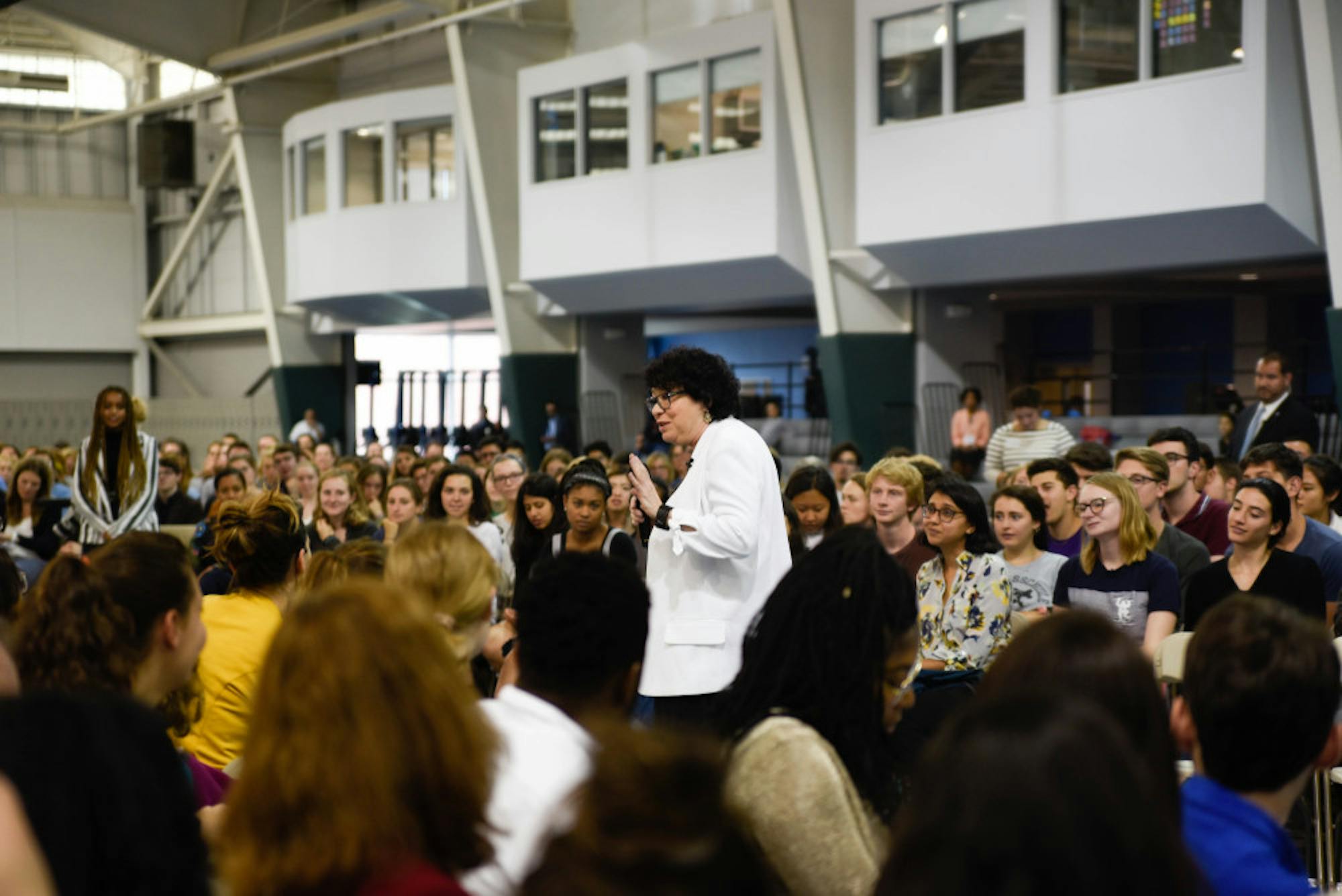Associate Justice of the Supreme Court Sonia Sotomayor spoke before an audience of around 3,000 in Gantcher Family Sports and Convocation Center yesterday afternoon.
The university-wide event, which was organized by the Office of the President, began at 3:30 p.m. and ran for an hour. Tufts Professor of History Peter Winn acted as the moderator for the forum.
University President Anthony Monaco delivered opening remarks welcoming Sotomayor and introduced Winn.
Winn, who specializes in Latin America, taughtJustice Sotomayor during her time at Princeton and served as her senior thesis advisor, where she conducted research on the history of Puerto Rico.
Shortly after, Sotomayor and Winn took the stage. Before beginning the discussion, Winn acknowledged the pair’s history.
“When we first met, you were asking the questions, and I was trying to come up with the answers. Now I think, perhaps, our positions are reversed,” he said.
Winn first drew attention to Sotomayor’s background growing up in a modest family in the Bronx and asked about the relationship between her background and success.
“There’s a little part of me that would love to go back and do a do-over of college,” Sotomayor said. “I think my undergraduate career is the seminal point in my life. It transformed me into a person capable of succeeding.”
Justice Sotomayor then described the value of exploring a wide variety of topics and immersing oneself fully within the special sense of community that college offers.
“You are in a place where there are people from all across the United States and probably people from around the world. You have an opportunity to meet people who live lives differently than you do. Befriend them,” she said.
Winn transitioned the conversation, asking Sotomayor to offer advice to those students who might be interested in pursuing careers in the justice system.
“Live your passion, take advantage of every moment you are exposed to something. Squeeze out of every bit of information you can knowledge and engage the world around you. Be curious about [the world] constantly," Sotomayor said.
Finally, Winn asked about the justice’s ability to particularly inspire those of diverse backgrounds like hers.
“I know there are so many people out there like me, who have lived in difficult and challenging circumstances,” Sotomayor said. “That despite all of that, happy endings are possible.”
For Rachel Mintz, it was inspiring to see someone of Latinx identity elevated to the platform of Supreme Court Justice.
“This was a humanizing experience. [Sotomayor] is someone who didn’t come from a very privileged background and was able to navigate the system and reach the highest extent of her dream was very inspiring,” Mintz, a sophomore, said.
The forum was then opened to questions from students.
The first question from the audience asked Sotomayor how much she believes her background influences her decisions and the importance of diversity on the court.
“I think it’s very important to have diversity on the court. But not the kind most of you are thinking about,” Sotomayor said. “Although there should be gender, racial and ethnic diversity on the court … I am more worried about the lack of diversity of experience. We have no justice with criminal law experience. We have no justice with environmental law experience, only one civil rights lawyer.”
For Max Miller, Sotomayor’s comment on diversity of the court was the most thought-provoking.
“I thought her talking about diversity in the law as most important part of a diverse court was something I never really thought about before,” Miller, a sophomore, said.
Rabiya Ismail, a sophomore, asked Justice Sotomayor about advice for women of color looking to go into public service.
“When I was in law school, one of my friends said to me: ‘I love you Sonia because you argue like a man,’” Sotomayor said. “I think [women] don’t feel heard, and we feel not heard because we are often tempted to in our presentation … when you are going into a room you have to be prepared, you have to be confident … we have to believe we are important.”
For the next question, the Justice was asked about her experience during her nomination and how it felt becoming the first Latina Supreme Court justice.
Sotomayor chronicled the challenges of the nomination process — a report stating that she was calling her character in the courtroom into question made her consider withdrawing herself from consideration.
Sotomayor was asked how she stays in touch with her roots, community and values as a justice.
“I spend a lot of time with a lot of different communities,” Sotomayor said.
She made clear she believes staying in touch with a wide swath of communities is essential to understanding the impact of her decisions on people’s everyday lives.
Sotomayor then discussed the importance of family in staying grounded. For first-year Sara Herrera, hearing Sotomayor discuss the importance of family was personal.
“Hearing [Sotomayor] talk about her grandmother was very emotional for me. I’m here, and I worry about my grandmother … this is the first time being away from her and I don’t see her often. I worry about that, coming home and her not being there anymore,” Herrera told the Daily.
The event’s final question, how the justices reconcile their political differences, had Sotomayor emphasizing the importance of humanizing people with whom you don’t see eye to eye.
“You assume that because someone disagrees with you they’re bad — they’re not. They have reasons for why they disagree. Sometimes these reasons may not seem compelling to you. But if you deal with people you respect, you can disagree,” she said.
Supreme Court Justice Sotomayor speaks about diversity of Supreme Court, being first Latina justice

Associate Justice Sonia Sotomayor walks through the aisles to speak to the Tufts community on Sept. 12.





